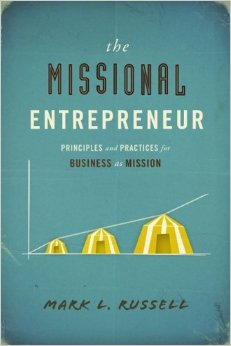|
The Navigator’s calling is simple yet very profound, To advance the Gospel of Jesus and his Kingdom into the nations through spiritual generations of laborers living and discipling among the lost. The last part has an interesting word: “living”. To some this would mean “where you live”, yet I believe it has bigger implications. I believe this word means “your entire life” or “as you live”. If this is the case then we are to be making disciples where we live, where we play, and even where we work. Every part of life. I began my journey of discovering God in the workplace as I was graduating college. Perfect timing. The commands were quite clear in the Bible: to work heartily as unto the Lord and to do everything for the glory of God (Ephesians 6:5-8 and Colossians 3:22-24). The lost were all around me, so I had no problem believing Jesus when he said the harvest was plentiful. The longer I work (which I’ll admit has not been very long) the more God teaches me about following him in every aspect of my life, even work. When I went to the Entrepreneurial Readiness Workshop (ERW) I didn’t really know what to expect. I didn’t have a business idea ready or even have one brewing. Not a feasible one, anyway. Yet I know now that God used that workshop to teach me more about himself. And I don’t have to start a Missional Enterprise to put what I learned into practice! The triple bottom line is foundational to running a successful Missional Enterprise. Yet this same triple bottom line has the ability to inform everyone’s work from a corporate job to an entrepreneurship.
While I don’t know where God is leading me in regards to starting a Missional Enterprise or joining an existing one yet, I am already able to apply lessons from the ERW to my current workplace. How will you bring glory to God in every aspect of your life? GEN Desk Contributing Author and Nav 20s City Leader
0 Comments
Our goal is to propel entrepreneurial teams as integrated and holistic lifelong laborers in business start-ups around the world. The Entrepreneur Readiness Workshop (ERW) is the first step to prepare for ministry as a Navigator missional entrepreneur. Missional enterprise is the Navigator’s Business as Mission (BAM) context to living out our calling.
ERW Details: September 30 – October 2, 2016 Navigator HQ in Colorado Springs, CO More info and Registration at www.gendesk.org/erw This workshop is for you if any of these apply to you...
FAQ:
Where are they now? ERW Alumni are currently starting new ventures around the world in places like Latin America, the Middle East, South Asia, East Asia, and the US. “Tom, you’re no longer strange to me.”
What in the world did Ivan, my close friend of two years, mean by that? My wife, our two middle-schoolers, and I had moved into a country that every national who had the chance was fleeing. Food was scarce. Utilities were sporadic. Unemployment was skyrocketing. Corruption was rampant. New criminal gangs were terrorizing the populace as they were fighting each other and carving out their territories. Our move from the suburbs of America to this collapsing country didn’t seem odd to me. It seemed more like an adventure to make a difference in the world by distributing humanitarian aid and leading bible studies with young adults who had never seen a Bible. I met Ivan and his wife on our first day in his country. They were both college graduates and were unemployed. I hired them as our language tutors, our interpreters, and our first employees. We shared life with them for hours on end for 5-6 days a week for two years. The bible studies seemed to be going well. Ivan was translating the materials from English into his native language. Using his artistic ability he also illustrated them with pen and ink drawings. Ivan was a new believer himself so our times in the Word were rich and special for him. I thought I was really connecting with Ivan, so what was that comment about me, “no longer being strange?” After our first 18 months in the country, I changed my focus from humanitarian aid to missional enterprise (BAM). As the enterprise grew we were able to employ more and more people. Job creation took the place of humanitarian handouts. Gainful employment restored dignity and removed the stigma of inferiority. The needs of our enterprise began to create auxiliary enterprises that provided employment for more people. This ripple effect of wealth creation made more sense to Ivan than our previous attempts of propping people up with bailouts. So why did Ivan think I was strange? When I asked him he gave me two reasons:
He also gave me two reasons why I was no longer strange to him:
It makes me wonder how many others have thought of me as strange when I thought I was just trying to help. - Missional Entrepreneur, GEN Desk Contributing Writer  “One of the great challenges for everyone is finding a place in the world – seeing a lot, hearing a lot, reading a lot, and then deciding where we will be and what we will do. Knowing what we know, what will we do?” - Steven Garber, Visions of Vocation “Knowing what we know, what will you do?” Garber’s question parallels the parable of the Good Samaritan. When the man was left half dead between Jerusalem and Jericho, the priest, Levite, and Samaritan all saw the depleted man. Yet, the priest and Levite chose not to engage in the brokenness. Instead, they continued on their journeys. When the Samaritan saw the man, he knew the man was hurt and in desperate need of help. With this knowledge, he chose to help the man. He brought the man to the inn and took care of him. In Visions of Vocation, Steven Garber stresses the importance of engaging in the broken world around us, similar to how the Good Samaritan engaged with the hurt man. As Christians, he says “it is clear that the way we live shows what we believe.” Through missional enterprise, we have a chance to live in a way that will demonstrate what we believe. As we see problems around the world, we get to engage and create positive social impact, financial sustainability, and spiritual transformation through business. Jesus’ Kingdom advances. As Garber exemplifies in his book, whether you have the desire to start a clinic in an area with inadequate healthcare, an agriculture business that treats employees fairly and grows crops honestly, or a climbing gym to build trust in a society where it is lacking, you get to create positive change that brings glory to God. Just like the Good Samaritan, it is important to see the wounds of the world and to do something about it. Missional enterprise is one context that allows the Kingdom to salve the pain of the wounds. What are some specific ways your business could see the world as it is and step into the brokenness to make an impact? What are ways you could be the Good Samaritan to the hurting in your community or around the world? – GEN Desk Intern
Impacting communities by bringing jobs and dignity! What other businesses do you think could provide TBL transformation?
Missional Enterprise: a Vehicle for Reconciliation “Throughout history, business has brought people together and pulled them apart. It has helped humankind progress while also revealing our darkest impulses.” It’s no secret that we live in a broken world … poverty, injustice, oppression, violence and corruption are all realities of the day and age we live in. Many businesses have been used as instruments of evil and exploitation, contributing to much of the brokenness in the world. However, “business can be an instrument in providing for humanity, an avenue to serve others, a place to exercise one’s gifts and skills, and a vehicle of reconciliation.” Which is why we need to understand God’s purpose for business and not let it remain in it’s broken state. In The Missional Entrepreneur, Russell presents four spheres of life that are broken and that God is on mission to reconcile:
Missional enterprise is an incredible opportunity to partner with God in bringing healing and renewal to each of these areas of brokenness. We easily understand how business can effect the economy in great ways and in more recent years, people are realizing the positive impact that businesses can have socially and environmentally; but the spiritual aspect of business bringing healing seems to be more allusive, yet crucial. The uniqueness of business is that it is an open door to everywhere and not just into physical places but also into the hearts of people. Everyday around the world people engage in business in a plethora of ways from the rich to the poor from the consumer to employee to owner. “Being missional is about living in a state of being that is at the center of God’s mission wherever you are … and the spiritual mission of business is not to establish a kingdom of wealth and power but to bring the Kingdom of God to tangible reality.” As businesses help build communities, provide for humanity, serve people according to their needs, and more; they become a physical expression of spiritual realities. This is what we strive for within the Global Enterprise Network; using the Triple Bottom Line to see Kingdom Values permeate all dimensions of enterprise unleashing the gospel. We do realize that God doesn’t need business and doesn’t need us to bring healing and reconciliation to the world but what a privilege that He invites us to join with Him to carry out His mission. What are some specific, small ways businesses can bring renewal and restoration to your corner of the world? And where do you see yourself called to join God in His mission of renewing the world? – GEN Desk Coordinator
|
Categories
All
Archives
March 2020
|



 RSS Feed
RSS Feed
